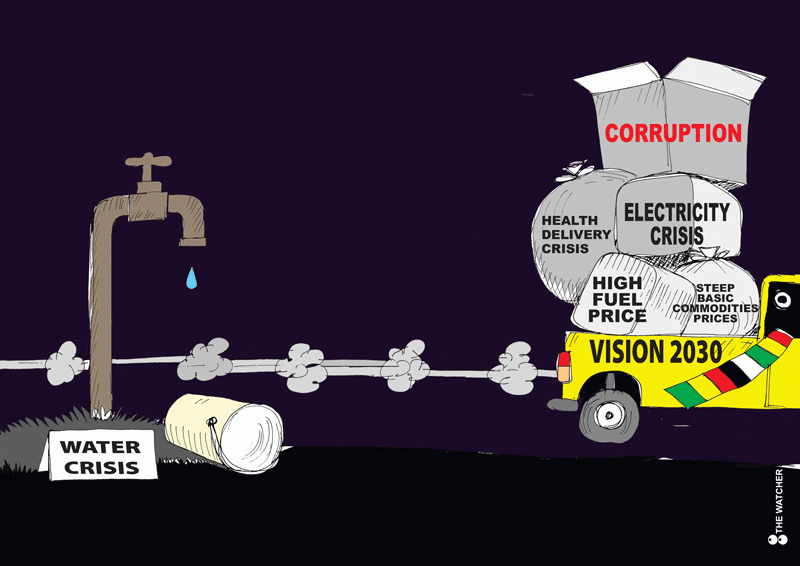
ZIMBABWE'S short-term insurance sector is poised for a technological revolution, courtesy of artificial intelligence (AI).
Experts believe that this innovation will boost industry efficiency, customer experience and risk management. But what exactly is AI, and how will it influence the economy and insurance sector?
AI refers to the simulation of human intelligence in machines, enabling them to think, learn and act like humans, according to Investopedia, a global financial media firm.
Its algorithms analyse vast amounts of data, identify patterns and make predictions or decisions.
In the context of short-term insurance, experts also note that AI will streamline processes, improve accuracy and provide personalised services.
Short-term insurance, also known as general insurance, provides financial protection for individuals and businesses against unforeseen events or losses that may occur within a short period, typically less than a year.
These include accidents, illnesses and natural disasters.
This type of insurance offers comprehensive coverage for various aspects of life, including vehicles, homes, businesses, travel and health.
- Time running out for SA-based Zimbos
- Sally Mugabe renal unit disappears
- Epworth eyes town status
- Commodity price boom buoys GB
Keep Reading
In Zimbabwe, where economic uncertainty and inflation are prevalent, short-term insurance provides a safety net for business continuity, financial security and economic growth.
The AI advantage
Many Zimbabwean insurance firms are yet to fully adopt AI in their operations.
However, its entry into the short-term insurance market is expected to bring significant improvements, according to Sibongile Siwela, insurance supervision director at the Insurance and Pensions Commission (Ipec).
"Ipec recognises the importance of artificial intelligence in the insurance industry, given its potential benefits to the insurance value chain, particularly underwriting, risk selection and management, calculation of regulatory capital requirements and faster claims processing," she told this publication.
"In terms of facilitating financial inclusion and consumer access to insurance, AI enables higher product personalisation, targeted marketing to relevant customer segments and accessible customer services."
Siwela underscored that AI adoption is growing across the insurance operational value chain at varying levels of sophistication and complexity in different jurisdictions.
According to her, AI adoption is a prominent agenda item at regional and international supervisory authority meetings, including those of the Sadc Committee of Insurance, Securities and Non-Banking Financial Authorities, the Association of African Insurance Supervisory Authorities and the International Association of Insurance Supervisors' (IAIS) Fintech Forum.
“At these regional and international fora, we share experiences and insights on the benefits of responsible use of AI technologies and how to manage risks associated with AI,” she said.
“Some African jurisdictions are already developing regulatory frameworks that allow insurers to test AI applications in underwriting and claims management within a regulatory sandbox. These learnings will inform our way forward regarding the adoption of AI.”
Siwela added: “Currently, there are no guidelines or standards that govern the usage of AI in Zimbabwe’s insurance sector given that this is a fairly new technology. We are tapping into the experiences of countries that have taken the lead in adopting AI in insurance.”
She highlighted that the IAIS is set to publish a draft application paper on supervision of AI on November 13, 2024 and supervisors that have not yet provided guidance in their respective markets are expected to benefit from the guidance being developed.
“Ipec will ride on the IAIS guidelines to develop standards that are specific to the Zimbabwean market,” she said.
Insurance Council of Zimbabwe marketing and public relations manager Ringisai Batiya said AI was undeniably a "major tool" in e-commerce and affecting both economic and lifestyle activities worldwide.
“The use of AI is encouraged in areas where it will bring improvements and efficiency to insurance industry operations and customer experience,” she said.
“In view of the different operations run by the industry in terms of ICT (information communication technology) systems used for business acquisition, claims process, client services etc. Insurers require an in-depth knowledge of AI to fully benefit from it as well as be on guard for the negative effects.
“The insurance industry is a service industry that is technically requiring explanations to policyholders as well as dealing with human emotions particularly at the claims stage hence some processes may not be left to be handled by AI tools only.”
Experts say AI-powered algorithms reduce claims processing time and increase accuracy, while AI-driven risk models will analyse vast data sets, enabling informed decisions. AI chatbots provide 24/7 support, tailoring policies to individual needs.
Additionally, AI will detect anomalies, flagging potential fraud and minimising losses.
Old Mutual Insurance Company managing director Gloria Zvaravanhu said digital platforms and mobile apps simplify obtaining quotes, comparing policies, and purchasing insurance.
She said AI and chatbots offer instant support and personalised recommendations for insurance covers, while telematics enables usage-based insurance, offering more affordable and personalised coverage.
“Blockchain technology ensures secure, transparent transactions and speeds up claims processing. All these technologies are now being used by leading insurers in Zimbabwe,” she said.
Clarion Insurance chief executive officer, Mainos Mudukuti, described AI as 'urgent' and a 'must' for insurance players.
Maxman Mutsau, general manager at Cell Insurance Company, acknowledged that most organisations and the local insurance industry at large are still lagging behind in terms of AI adoption.
He expressed hope for significant progress moving forward.
"This seems to fit well in the business strategy given the vast benefits that will come (with its) use," he said.
The benefits, according to him, include increased cost reduction in operations, enhanced customer service from personalised service offerings and continuous access of products and responsive services from AI powered platforms, improved data analysis and better decision making.
"Uses of AI literally seem to cut across all functions in insurance. For example, it can be effectively used in claims processing to weed out fraud by analysing certain anomalies," Mutsau said.
"In underwriting, it can be easily used to predict trends and forecasts that lead to appropriate pricing of risks while in customer service, there can be wide use of round the clock autonomous service offering through platforms powered by AI.
"As highlighted, this is still a fresh phenomenon in the local market but there are talks of many cases elsewhere in developed countries where AI has been successfully used in claims assessments, fraud detection, product designing and many other various uses."
Challenges and mitigation strategies
While AI brings numerous benefits, experts say insurers must acknowledge potential pitfalls.
AI models can perpetuate existing biases if trained on skewed data, according to KPMG’s 2023 Insurance CEO Outlook report.
Siwela said ethical considerations surrounding AI, such as bias, privacy, and accountability, pose challenges for organisations seeking to adopt its solutions.
"Implementing AI solutions can be expensive, requiring investments in technology, talent, and infrastructure. Demonstrating a clear return on investment can be challenging in some cases," she said.
"AI systems can be vulnerable to security threats, such as adversarial attacks and data breaches. While ensuring the security and resilience of AI solutions is essential, it can lead to significant challenges, especially regarding ensuring compliance with data protection regulations and maintaining data privacy."
Siwela added: "We envisage the issuance of guidance to the market on measures to mitigate the risks of adopting AI, including data privacy, legal risks, and cyber-security in 2025.
"This will serve to ensure that insurance companies implementing AI solutions adhere to relevant data protection regulations and conduct regular audits to ensure compliance."
Matsau said there is still a huge gap in terms of skills sets locally and hopes "our increased interest in the subject will enable skills transfer from developed markets as well as faster transfer of knowledge in our local institutions of learning."
As a balance to AI’s huge potential, the KPMG report revealed that CEOs were acutely aware of the hurdles.
It said ethical issues around AI decision-making and the absence of robust regulation were the most prominent concerns.
Over 72% of CEOs, according to the report, agreed that AI regulation should parallel the rigor of climate commitment regulations, which have seen a steady increase in detail and volume.
“A robust regulatory framework for AI is needed that’s proportional to the risks. Regulation should not stifle innovation but safeguard usage,” Mark Longworth, global head of insurance advisory at KPMG International and Partner at KPMG in the UK, is quoted in the report as saying.
Cybersecurity is another major concern, the report noted.
"The KPMG global tech report also highlighted that 63% of respondents either agree or strongly agree that improving cybersecurity and privacy will help them provide a loyalty-winning customer experience," it said.
Successful AI implementation hinges on high-quality data. Again, the KPMG global tech report revealed that better data management and integration have been the top benefits for insurance companies.
"They are aware that data quality before cloud migration is key to effective AI applications, and that clean, well-organised data is essential for AI to ensure accurate, transparent and fair decision-making," the report said.
"This also links back to regulation as insurers with unstructured or fragmented data will face significant challenges in meeting new legislation and building trust in the market."
To harness AI's potential while mitigating risks, insurers must implement responsible AI practices, prioritising transparency, accountability and employee re-skilling programmes.
They must ensure rigorous data management, safeguarding against breaches and ensuring accuracy.
Insurers should foster human-AI collaboration, balancing AI-driven insights with human expertise and empathy.
The future of short-term insurance in Zimbabwe
As Zimbabwe's short-term insurance sector embraces AI, the future looks bright, but caution is essential.
By acknowledging AI's dangers and adopting responsible practices, insurers can revolutionise the industry while protecting customers, employees and their reputation.
This technological revolution will enhance customer experience, improve risk management, drive economic growth and position Zimbabwe as a leader in AI adoption and innovation.
The harmonious integration of AI and human expertise will propel Zimbabwe's short-term insurance sector forward, ensuring a brighter future for all stakeholders.
AI is evolving at pace, and there is a lot to learn.
The KPMG 2023 Insurance CEO Outlook also highlighted a significant degree of trust in AI with 58% of CEOs in insurance feeling confident about achieving returns on investment within five years.
There were 1 262 registered entities or persons in the country's short-term insurance industry as at March 31, 2024, according to Ipec. This represented a 5% increase compared to the same period last year.
The figure included 20 insurance companies, 11 micro-insurance companies, 10 reinsurance companies, 28 insurance brokers, eight reinsurance brokers, four underwriting management agencies, 62 loss assessors, 207 corporate agents, and 912 sole agents.











